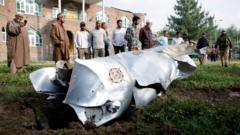As the Israeli-Hamas conflict intensifies, the World Health Organization (WHO) has expressed grave concerns over the state of hospitals in Gaza, describing conditions as "beyond description." Following an air strike that severely damaged al-Ahli hospital, WHO's spokesperson Dr. Margaret Harris reported ongoing assaults on medical facilities and healthcare workers, leading to catastrophic shortages of medical supplies due to Israel's blockade of the region.
Gaza Hospitals in Crisis After Attacks: WHO Reports Dire Conditions

Gaza Hospitals in Crisis After Attacks: WHO Reports Dire Conditions
The World Health Organization highlights catastrophic conditions in Gaza hospitals following continuous Israeli air strikes, with critical shortages in medical supplies.
On Sunday, al-Ahli hospital, a pivotal medical facility in Gaza City, was struck by Israeli missiles, destroying its laboratory and causing significant damage to its emergency services. While hospital officials reported minimal direct casualties, it was noted that a child perished due to the disruption of timely medical care. The Israeli military claimed the attack targeted a Hamas command center adjacent to the hospital.
The Anglican Diocese of Jerusalem confirmed that this strike marked the fifth attack on the hospital since the onset of the conflict and condemned the action, stressing the need for Israel to provide credible evidence for its claims. The strike has left al-Ahli incapable of receiving new patients, critically impacting those in need of urgent trauma care, and has forced the relocation of many patients.
WHO Director General Dr. Tedros warned that international law mandates the protection of hospitals, and that repeated attacks on healthcare facilities must cease. He emphasized that health workers are essential for saving lives and should not be targets of conflict.
The Church of England raised alarms over the transformation of hospitals into battlegrounds, calling for an independent investigation into the recent attacks. As medical supplies dwindle, reports indicate that medical institutes like al-Ahli are struggling to maintain adequate care, with one orthopaedic surgeon likening its capacity to that of a hostel.
The WHO and various humanitarian organizations have reiterated the urgent need for humanitarian aid to enter Gaza; however, conditions remain precarious with the Israeli military blocking supplies. Amid continued hostilities, the humanitarian situation grows increasingly dire, leading to fears for the wellbeing of both patients and healthcare providers in the region.
According to reports, the conflict has claimed over 50,980 lives in Gaza, intensifying calls for ceasefire talks between Israeli and Hamas representatives. As negotiations appear stalled, the humanitarian crisis deepens, with the international community urging for a cessation of hostilities to allow for urgently needed assistance to reach those affected.
The Anglican Diocese of Jerusalem confirmed that this strike marked the fifth attack on the hospital since the onset of the conflict and condemned the action, stressing the need for Israel to provide credible evidence for its claims. The strike has left al-Ahli incapable of receiving new patients, critically impacting those in need of urgent trauma care, and has forced the relocation of many patients.
WHO Director General Dr. Tedros warned that international law mandates the protection of hospitals, and that repeated attacks on healthcare facilities must cease. He emphasized that health workers are essential for saving lives and should not be targets of conflict.
The Church of England raised alarms over the transformation of hospitals into battlegrounds, calling for an independent investigation into the recent attacks. As medical supplies dwindle, reports indicate that medical institutes like al-Ahli are struggling to maintain adequate care, with one orthopaedic surgeon likening its capacity to that of a hostel.
The WHO and various humanitarian organizations have reiterated the urgent need for humanitarian aid to enter Gaza; however, conditions remain precarious with the Israeli military blocking supplies. Amid continued hostilities, the humanitarian situation grows increasingly dire, leading to fears for the wellbeing of both patients and healthcare providers in the region.
According to reports, the conflict has claimed over 50,980 lives in Gaza, intensifying calls for ceasefire talks between Israeli and Hamas representatives. As negotiations appear stalled, the humanitarian crisis deepens, with the international community urging for a cessation of hostilities to allow for urgently needed assistance to reach those affected.


















